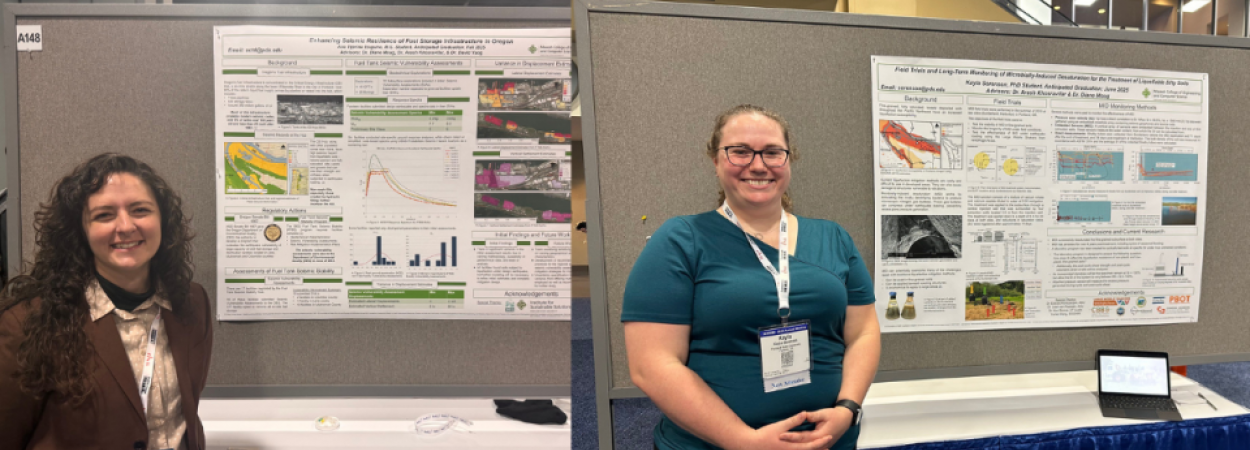Two Portland State University students were awarded Dwight D. Eisenhower transportation fellowships this month at the 104th Annual Meeting of the Transportation Research Board (TRB). Kayla Sorenson and Ana Tijerina Esquino, both graduate students in the Maseeh College of Engineering and Computer Science at PSU, were presented with the awards by the US Department of Transportation (USDOT). This was the second Eisenhower for Sorenson, who also received the fellowship last year. See below for a short interview with each of the PSU Eisenhower Fellows, and if you missed TRB this year, check out some of the PSU research highlights.
Ana Tijerina Esquino
Ana Tijerina Esquino is a civil engineering masters student and graduate research assistant. She is currently researching ways to advance seismic resilience for Oregon’s fuel storage infrastructure.
Tell us about your research?
My work analyzes seismic vulnerability assessments from the state’s Fuel Tank Seismic Stability (FTSS) program, focusing on trends in geotechnical practices, liquefaction and ground failure estimations, and structural risk evaluations. By identifying best practices for vulnerability assessments, the research supports efforts to protect critical infrastructure like the CEI Hub, which supplies over 90% of Oregon’s liquid fuel and is highly vulnerable to Cascadia Subduction Zone earthquakes.
How does it feel to be recognized with an Eisenhower fellowship?
It’s an incredible honor, and I’m excited to attend TRB for the first time! I can’t wait to see how my research fits into broader transportation challenges and learn from others tackling similar issues. The fellowship is a huge motivator to keep working toward solutions that make our region safer and more resilient.
Kayla Sorenson
Kayla Sorenson is a civil engineering PhD candidate. Her work focuses on the liquefaction susceptibility of fine-grained soils, which has important applications for infrastructure resilience.
Tell us about your research?
My current research focuses on soil liquefaction, and how varying the levels of soil saturation affects the strength of the soil. Think of soil like a sponge - when all of the holes and fibers are completely full of water (no air anywhere), then the soil is completely saturated (Sr = 100%). When this soil is cyclically sheared simulating earthquake loading, it will fail after a certain amount of time.
Now the sponge (soil) is allowed to dry just a little, and some of these holes and fibers now have tiny air bubbles throughout it (Sr < 98.5%). When this soil is tested under the same conditions above, the soil will take a longer time to fail since the soil has more resistance to the cyclic shearing.
To continue the analogy, while we know how the above tests affect a kitchen sponge (sand), we don't know how these tests affect a different type of sponge (silts, specifically for my research).
While the above work is being performed in the lab, it's a continuation of work done in the field. In the summer of 2019, field trials of microbially induced desaturation (MID) were performed at two sites in Portland Oregon which consisted of fine-grained soils (silts and clays). MID is an emerging bio-remediation technique that has the potential to be used underneath existing buildings in an non-invasive manner to mitigate liquefaction in these soils. Using in-situ microbes, they are fed a chemical solution which results in carbon dioxide and nitrogen gas. These gas bubbles lower the saturation of the soil which increases its resistance to liquefaction. The field trials have shown that MID is successful at treating fine-grained soils and persists for a number of years.
How does it feel to be recognized with an Eisenhower fellowship?
It's an honor to be recognized not only once, but twice! I consider it a special distinction as a geotechnical student to be awarded a transportation-focused fellowship. I'm glad other people see value in my research and its potential to cross engineering disciplines.
Connect with Kayla on LinkedIn.
Portland State University's Transportation Research and Education Center (TREC) is a multidisciplinary hub for all things transportation. We are home to the Initiative for Bicycle and Pedestrian Innovation (IBPI), the data programs PORTAL and BikePed Portal, the Better Block PSU program, and PSU's membership in PacTrans, the Pacific Northwest Transportation Consortium. Our continuing goal is to produce impactful research and tools for transportation decision makers, expand the diversity and capacity of the workforce, and engage students and professionals through education, seminars, and participation in research. To get updates about what's happening at TREC, sign up for our monthly newsletter or follow us at the links below.
BlueSky | Instagram | LinkedIn | Facebook | Threads | YouTube




